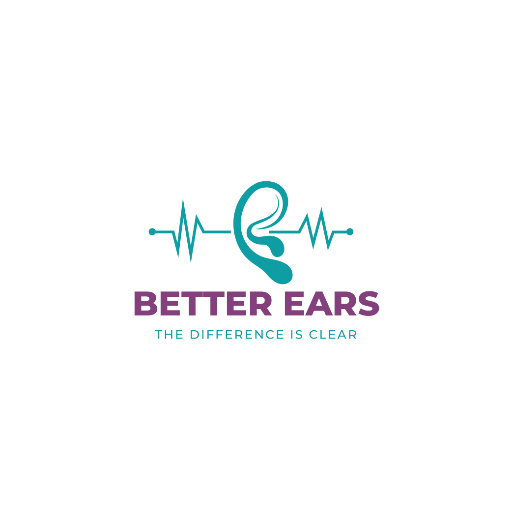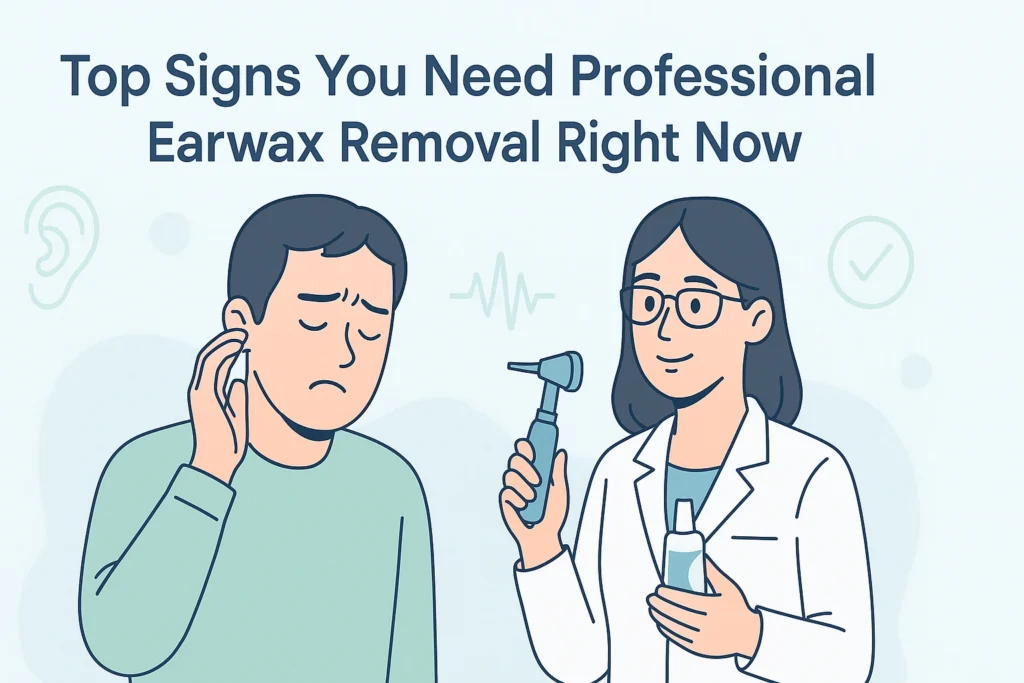
Earwax is a natural and necessary part of ear health, but when it builds up too much, it can cause serious discomfort and affect your hearing. Many people ignore the early signs of earwax blockage until it becomes painful or leads to hearing loss. Knowing when to seek professional earwax removal can save you from infections, dizziness, or even permanent hearing damage. Let’s explore the most common warning signs and why professional treatment is the safest solution.
What Is Earwax and Why Does It Build Up?
The Natural Role of Earwax
Earwax (cerumen) protects the ear canal by trapping dust, bacteria, and debris. It also helps keep the ears lubricated and prevents infections.
What Causes Excessive Buildup?
Excess earwax can form due to:
- Overproduction of wax by glands
- Regular use of earbuds or hearing aids
- Narrow ear canals
- Use of cotton swabs pushing wax deeper
- Aging (wax becomes drier and harder)
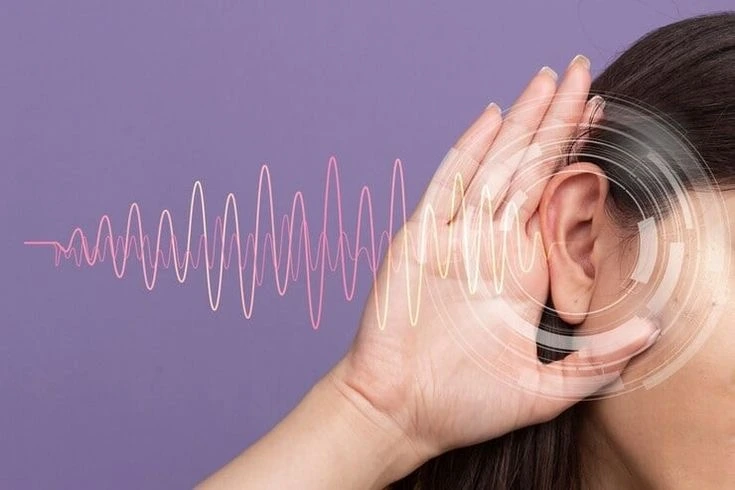
1. Muffled or Reduced Hearing
How Earwax Blocks Sound Waves
When earwax blocks the ear canal, it prevents sound from reaching the eardrum properly, causing muffled or distorted hearing.
When to Get Checked
If you’ve noticed you’re turning up the TV volume or struggling to hear conversations, it may be time for professional removal.
2. Ear Pain or Fullness
Why Wax Can Cause Discomfort
When wax presses against the eardrum, it creates pressure, leading to pain or a sensation of “fullness.”
When the Pain Signals a Deeper Issue
Persistent pain could mean an infection or impacted wax—both require professional attention.
3. Ringing or Buzzing Sounds (Tinnitus)
The Connection Between Wax and Tinnitus
Trapped earwax can irritate the ear canal, triggering ringing or buzzing noises.
How Professionals Safely Relieve It
Through microsuction or irrigation, audiologists gently remove wax without damaging delicate ear structures.
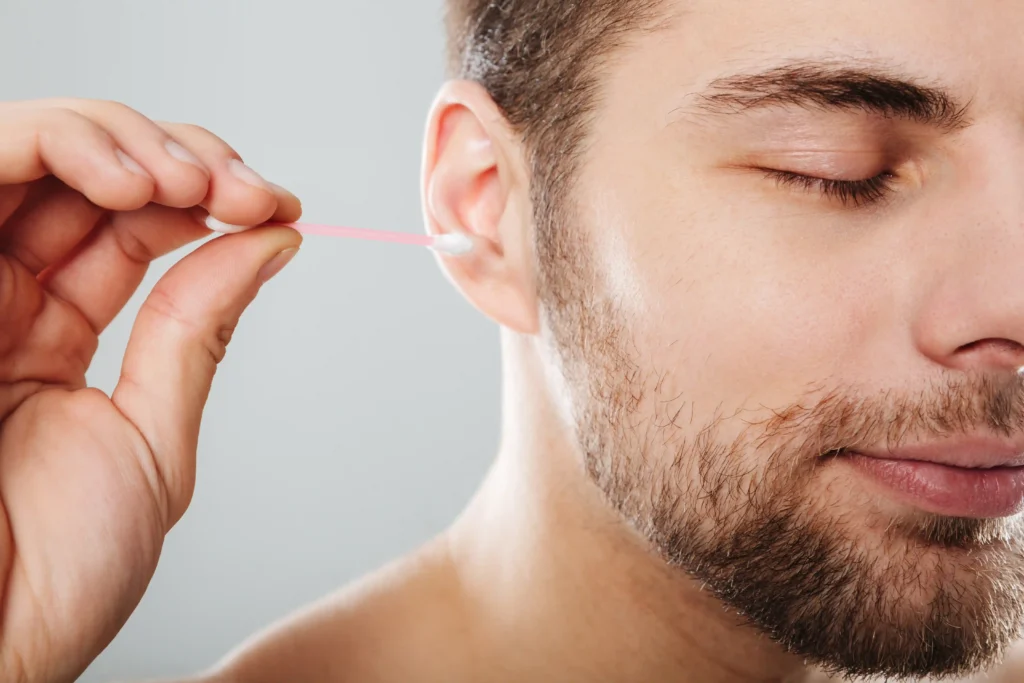
4. Dizziness or Balance Problems
How Earwax Affects Your Balance
Your inner ear helps control balance. When wax buildup disrupts it, you may feel lightheaded or unsteady.
Why This Symptom Should Never Be Ignored
Dizziness combined with hearing loss can indicate a serious issue—book an appointment right away.
5. Itchy, Irritated, or Smelly Ears
Signs of Infection Caused by Wax Buildup
Blocked ears trap moisture and bacteria, leading to infections that cause itching, odor, and irritation.
When Itching Means It’s Time for Removal
If the itch persists despite cleaning, professional removal is essential to clear the blockage and prevent further problems.
6. Earwax Visible at the Canal’s Edge
Why Self-Cleaning Is Risky
Trying to remove visible wax with fingers, tweezers, or cotton swabs can push it deeper, increasing the risk of injury.
Safe Professional Alternatives
Clinics use sterile, gentle equipment to remove wax safely and completely—often in just one session.
When DIY Methods Stop Working
Why Cotton Swabs and Drops Often Fail
Cotton swabs only move wax around, and ear drops sometimes soften wax without removing it.
When to Switch to Professional Microsuction
If you’ve tried home remedies with no success, book a microsuction earwax removal—it’s quick, dry, and safe.
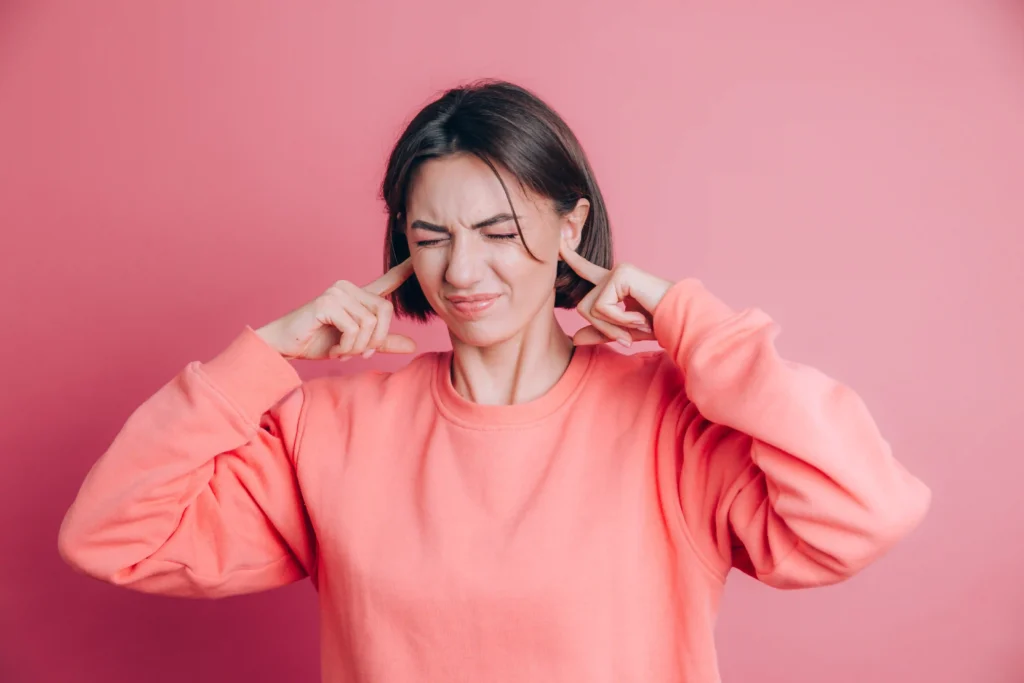
What to Expect During a Professional Earwax Removal Appointment
Step-by-Step: Examination, Removal, Aftercare
- Examination – The audiologist checks your ear canal with a microscope.
- Removal – Using microsuction or irrigation, they gently remove the wax.
- Aftercare – You’ll get advice on preventing future buildup.
Common Methods Used by Audiologists
- Microsuction (most precise)
- Irrigation (controlled water-based cleaning)
- Manual removal (for hard or dry wax)
Benefits of Early Professional Earwax Removal
Preventing Infections and Hearing Issues
Prompt removal keeps your ears clean, healthy, and infection-free.
Saving Time, Money, and Discomfort
Professional care is faster, safer, and more cost-effective than repeated failed DIY attempts.
FAQs About Earwax Symptoms and Removal
Q1. Can earwax cause permanent hearing loss?
Not usually—but long-term blockage or infections can, so don’t delay removal.
Q2. Is microsuction painful?
No, it’s typically quick and painless.
Q3. How often should I get earwax removal?
Most people benefit from it every 6–12 months.
Q4. Can I use ear drops regularly?
Occasionally, yes—but not as a long-term solution.
Q5. What if I ignore the symptoms?
Ignoring buildup can lead to infections, dizziness, and hearing issues.
Conclusion: Don’t Wait—Get Checked Early for Clear, Healthy Hearing
If you’re noticing hearing loss, ringing, pain, or dizziness, these are clear signs you need professional earwax removal right now.
Ignoring symptoms can make things worse—but a quick visit to a trusted clinic can instantly restore comfort and clarity.
Don’t risk your hearing with DIY methods—book a professional appointment and enjoy the relief of clear, healthy ears.
